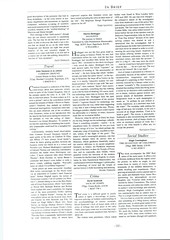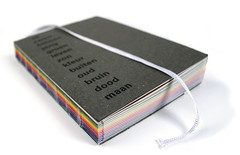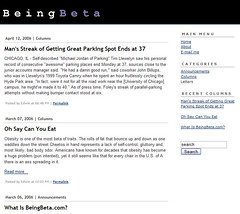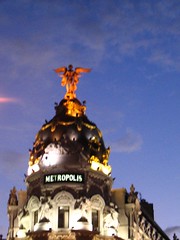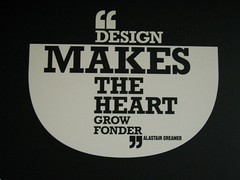The Venice Project (the new thing from the people who brought you Skype and KaZaa) are looking for some thoughts on the future of TV. Here are mine.
-------
....Hopefully it goes without saying that these are ideas beyond mere bandwidth and narrowcasting - The Venice Project’s compelling idea should be about more than the shift from a ‘few-to-many’ world to a ‘many-to-even more’ one.
Thought 1 - Change the metaphor. Better still, find a new one
Using the words ‘TV’ or ‘television’ sets an expectation in people’s minds. About content quality, image quality, narrative structure, information provision, viewing experience. You say that you are going to take the ‘best elements of the TV experience’. But will you deliver those via a TV? If not, then you are better off finding a new way of describing the service and the experience. Don’t get locked into an old media description of what you are trying to do, just because you feel people won’t get something new, or are too familiar with the idea of TV. If you educate them properly, they will learn and follow. (Oh, and not calling it TV also frees you from some of the existing UK and European restrictions on the provision of audiovisual content and services.)
Thought 2 - People will still make appointments to view…
…its just that you won’t control their diaries. Yes, people will want to see things immediately that have been sent to their inboxes. But people will also want to re-watch that content at a different time, in a more leisurely and relaxed setting. So content has to be always there, available,accessible and quick to get.
Thought 3 - Channel branding is not dead
Yes, people do search and watch particular programmes, with no regard for network. But people do still have a suite of channels, aboutthree or four, which they feel are theirs, which they turn to most regularly toprovide them with a well-edited choice of content that they can relax in front of. The Venice Project should aim to become one of those destinations, one ofthe three or four channels in people’s suite.
Thought 4 - People do not mind being interrupted by adverts
But they had better be good ads, or people will flip over, surf away or switch off. And ‘good’ in this context means creative, funky, irreverent, powerful and gripping. And if the ads can’t be good, then make sure that sponsorship and product placement are easy to make happen, and that people can interactively follow-up, ideally with one click.
Thought 5 - People will still expect to see ‘TV’ on a TV
A similar point to thought one – but how do you get round it? Well, by making sure that your content is backwards compatible with old 625 lines sets as well as the latest in high-definition plasma screens. And by also making it easy for people to transfer content to and from different devices, whether that’s old school TVs or new school PDAs, laptops… wherever there’s a screen.
Thought 6 - Complex narratives are better narratives
On the London stage at the moment is a play called Frost/Nixon, which deals with one of the most high-profile television events of the last century. At one point a character says, “The first and greatest sin oftelevision is that it simplifies. Diminishes. Great, complex ideas, tranches oftime, whole careers, become reduced to a single snapshot.”
Except that this is changing. If you read Steven Johnson’s excellent Everything Bad Is Good For You, you’ll come away from it with the belief that not only are people now able to cope with much more complex narratives in their TV content (far more complex than most films), but that audiences actively demand them, and get engaged with them – just look at the way the viewers of Lost turn the notion of passive ‘viewers’ on its head, not sitting back but getting involved on and offline. And shows that engage more lead to a more upmarket audience profile and therefore more lucrative advertisers.
So the challenge is, how do you move beyond the first flowering of TV in an online world (once unfairly characterised to me as, “Dogs falling off their skateboards on YouTube”), and support narrative complexity in a fragmented world?
Thought 7 - Everyone will be a ‘caster
We know this. YouTube has shown this. MTV Flux will showthis. Current TV shows that people will do this with a particular politicalviewpoint. The real question is: what kind of ‘caster?
My answer: The Venice Project should be about, and facilitate, ‘socialcasting’: not just allowing people to find the watercooler moment they talk about the next day; but helping people to create and share their own watercooler moments. And through this sharing and the wider social network that people create, you avoid the limiting dangers of television soeloquently warned about by Edward R Murrow: "This instrument can teach, it can illuminate; yes, and it can even inspire, but it can do so only to the extent that humans are determined to use it to those ends. Otherwise it ismerely wires and lights in a box."
That’s the challenge for The Venice Project: to take TV beyond wires and lights in a box.
One more thought: I’m sure you know about the film of thesame name that you currently share: http://movies.aol.com/movie/the-venice-project/1137471/synopsis. A great start for the brand would be to make this the first piece of contentavailable to users. A quiet nod to your past, and great start for an exciting future.

